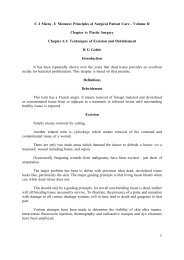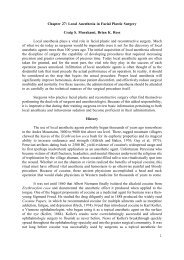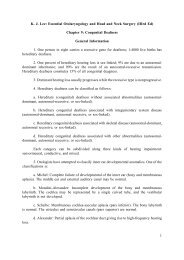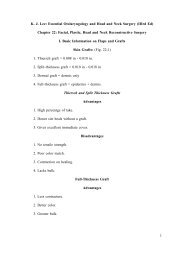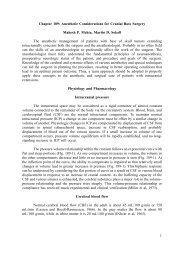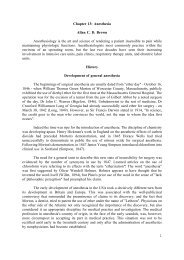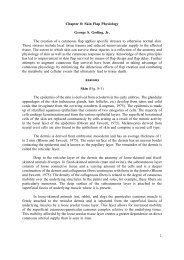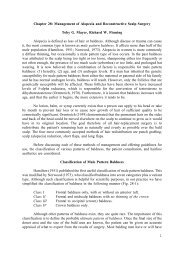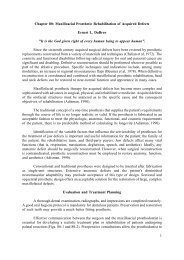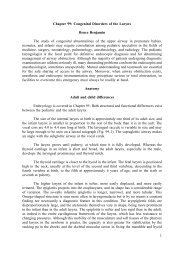1 C J Mieny, U Mennen: Principles of Surgical Patient Care - Volume ...
1 C J Mieny, U Mennen: Principles of Surgical Patient Care - Volume ...
1 C J Mieny, U Mennen: Principles of Surgical Patient Care - Volume ...
- No tags were found...
You also want an ePaper? Increase the reach of your titles
YUMPU automatically turns print PDFs into web optimized ePapers that Google loves.
Endotracheal intubation must be performed as soon as possible. Intravenous antibiotics,close observation in hospital and systematic steroids are <strong>of</strong>ten required. The antibiotics <strong>of</strong>choice are ampicillin or chloramphenicol and should be continued for seven to ten days.Extubation is usually possible after 48 hours. It may be necessary to perform anemergency tracheotomy initially. If intubation is prolonged, i.e. > 72 hours, an electivetracheotomy should be considered.Acute Laryngotracheobronchitis (Croup)Croup is usually a viral infection <strong>of</strong> the larynx, trachea and bronchi. It is sometimescaused by Staphylococci, Pneumococci or Haemophilus influenzae. Diphteric laryngitis ispossible in non-immunized persons. The symptoms and signs <strong>of</strong> acutelaryngotracheobronchitis are characteristic and comprise the following:- A loud raspy cough- Dyspnoea- Inspiratory stridor- Hoarseness- Oedema <strong>of</strong> the larynx- Thick mucus and tendency to crusting- Expiratory bronchi- Upper respiratory tract infection- Pneumonia.The diagnosis <strong>of</strong> croup is usually quite easy. A significant subglottic oedema is clearon X-rays, especially on the anteroposterior views. Culture <strong>of</strong> secretions will confirm thecausative organisms but treatment should commence immediately and be adjusted later ifnecessary.Hospitalization is mostly indicated. Humidification, and nebulized adrenalineinhalations (1 mL 1:1000 adrenaline plus 1 mL saline) are essential in all but grade 1 croup.Inhalations may have to be repeated at half-hourly intervals if obstruction is severe.Tracheostomy or endotracheal intubation will be called for in severe cases and should be doneif the respiratory or heart rate increases or cyanosis develops.Antibiotics should be used in case the causative organism is non-viral. Steroids maybe used if herpes simplex is not present. Anxiety or restlessness compound the problem andshould be kept to a minimum. Light sedation which does not cause respiratory depression isto be encouraged, i.e. trimeprazine. Diphtheria antitoxin should be given to susceptibleindividuals or when clinically signs are found.The complications include pneumonia, atelectasis and total respiratory obstruction. Thesequelae <strong>of</strong> intubation and tracheotomy are ever present, i.e. tracheal stenosis orpneumothorax.16



